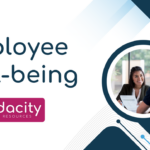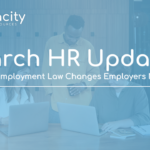Hot HR Issues and Trends
Because the start of 2025 has been a bit dull and boring this year (just kidding!), this post reviews 3 hot HR issues and trends impacting employers.
Hot HR Issues 1: Remote Hiring
Remote work scams started to emerge several years ago, disrupting remote hiring. In one version of the scam, a fake online employer would hire an unsuspecting new employee and start the onboarding process. Active job seekers often applied to many online job opportunities, so it was easy to miss warning signs. By the time the new “employee” realized they were victim to a scam, the “employer” would disappear, often after obtaining private information generally provided during onboarding such as social security number, date of birth, and bank information.
Remote hiring scams have taken a dangerous and dark turn. A report published recently by cybersecurity firm Palo Alto Networks warns employers of the dangers of “real-time deepfake technology.” According to the report, hackers are using this technology to infiltrate organizations through remote work positions, posing significant security, legal and compliance risks. With easy access to rapidly evolving AI and technology tools, hackers “easily create convincing synthetic identities” and interview with unsuspecting employers. Using the deepfake technology, the hacker is hired by the unsuspecting employer and gains access on the inside as a remote employee.
The Federal Bureau of Investigations (FBI) is also warning employers to utilize mitigation techniques to avoid these hiring scams that are often used to target propriety and financial data. Savvy employers that utilize remote hire processes and remote workers will be well served to work with internal and/or external experts to ensure adequate safeguards are in place.
Hot HR Issues 2:
Federal Collective Bargaining
On March 27th, President Trump signed an executive order aimed at effectively ending federal collective bargaining agreements (CBAs) across a wide range of governmental agencies with “national security missions.” The list includes the Department of Defense, Department of Veterans Affairs, the National Science Foundation, the Coast Guard, U.S. Citizenship and Immigration Services, U.S. Immigration and Customs Enforcement, the Department of Justice’s Executive Office of Immigration Review, the Office of Refugee Resettlement within the Department of Health and Human Services, and the Department of State, among many others.
A CBA is a “written legal contract between an employer and a union representing employees. This agreement results from an extensive negotiation process covering essential topics such as wages, work hours and employment conditions.”
The American Federation of Government Employees (AFGE) issued a strong response, describing the executive order as a “disgraceful and retaliatory attack on the rights of hundreds of thousands of patriotic American civil servants.” The AFGE is the largest federal employee union and predicts the executive action impacts the collective bargaining rights of over one million federal employees. The National Treasury Employees Union (NTEU) sued to block the order, arguing the President overstepped his authority. Federal employers should continue to consult with labor counsel on navigating the impact of the executive order.
Hot HR Issues 3:
On the Horizon: Minnesota Paid Leave
The new Minnesota Paid Leave law will take effect on January 1, 2026, covering most employers in the state. The new law will provide two primary types of paid leave:
- Family Leave. This will provide paid parental leave and/or paid time off for an employee to provide care for a family member with a serious health condition.
- Medical Leave. This will provide paid time off for an employee when a serious health condition prevents the individual from working.
Upon implementation, eligible individuals will be entitled to a maximum of twelve weeks of family leave or a maximum of twelve weeks of medical leave in one benefit year. If an individual uses both medical and family leave within a single benefit year, paid leave will max out at twenty weeks.
The premium rate for the new law will be 0.88 percent and is a percentage of wages that will be paid by the employee and the employer to fund the program. The first premium payments will be due on April 30, 2026, and will be based on wage detail reported between January 1, 2026, and March 31, 2026. Small employers (currently defined as having 30 or fewer employees) will pay a reduced premium rate.
Minnesota DEED (Department of Employment and Economic Development) issued guidance for employers opting for private plans. To comply with the new law, employers will have three options: (1) pay into the state-run plan; (2) apply to administer their own private plan; or (3) purchase a qualifying plan from a third-party insurance carrier. Both options (2) and (3) must be approved by the state.

Unsure how to navigate the complexities of employment law changes? Check out our recent blog post for tips and guidelines.
About the Author
HR Consultant, Stacy Johnston, provides innovative solutions with a mission to support organizations in understanding and engaging their biggest competitive advantage… their employees. Johnston is a licensed attorney in Minnesota and holds the SHRM-CP (Certified Professional) credentials.
About Audacity LLC: HR Consulting
Audacity LLC’s passion is HR. We help organizations build peace of mind, dial in productivity and enhance employee engagement by creating agile HR solutions that align with mission and core values.
Comprehensive solutions include tips and tools to effectively recruit, hire, onboard and retain an engaged and skilled workforce.
Bold and innovative Human Resource solutions that save valuable time and money.
“Let US focus on HR while YOU focus on what you do best ~ building your organization and serving your mission! From HR policies, employee handbooks and training to recruiting, hiring, onboarding and performance management. Let our expertise be your guide!”
Ask about our half-day, full-day and multi-day training options, including our completely online HR Bootcamp!
Reach out for a free and confidential consultation at info@audacityhr.com.






